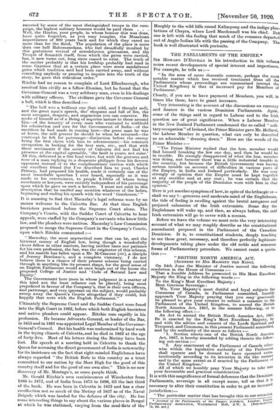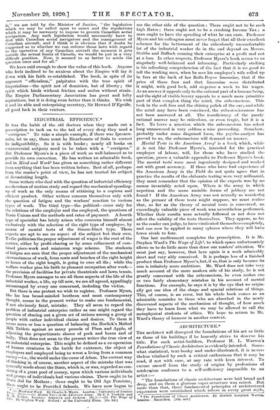THE PARLIAMENTS OF THE EMPIRE.*
Sin HOWARD D'Eovruz in his introduction to this volume notes recent developments of special interest and importance. For example, he tells us :—
" In the area of more domestic concern, perhaps the most notable matter which has received treatment from all the Parliaments whose proceedings are summarised (except the United Kingdom) is that of increased pay for Members of Parliament."
Clearly, if you are to have payment of Members, you will, in times like these, have to grant increases.
Very interesting is the account of the discussions on currency and finance in the various Dominion Parliaments. Again, sonic of the things said in regard to Labour and to the Irish question are of great significance. When a Labour Member in the New Zealand Parliament condemned the so-called " mili. tary occupation " of Ireland, the Prime Minister gave Mr. Holland, the Labour Member in question, what can only be described as an admirable "dressing down." Here are the words of the Prime Minister :—
" The Prime Minister replied that the hon. member would find himself breaking the law one day, and then he would be in trouble. He strongly disapproved of what the hon. member was doing, not because there was a little industrial trouble in the country, but because the British Government was having serious trouble on account of difficulties in various parts of the Empire, in India and Ireland particularly. Ile was very strongly of opinion that the Empire must be kept together at any sacrifice and at any cost ; he was certain that the majority of the people of the Dominion were with him in that opinion."
Here is yet another symptomof how, in spite of the lethargic or— shall we say 7—generous and moderate mind of the Englishman, the tide of feeling is swelling against the brutal arrogance and perjured calumnies of the Irish extremists. Some day the Englishmen will wake up, and then, as always before, the said Irish extremists will go to cover with a scream.
Before we leave the volume we must note the very interesting account of what we may roughly describe as the constitutional amendment proposed in the Parliament of the Canadian Dominion. It is, to constitutional students, deeply touching to see these great, necessary, and therefore perfectly legitimate developments taking place under the old noble and sonorous forms of Parliamentary procedure. We cannot resist a quota. tion
"BRITISH NORTH AMERICA ACT.
(ADDRESS TO HIS MAJESTY TILE Knee).
On 24th June the Minister of Justice moved the following resolution in the House of Commons :— That a humble Address be presented to His Most Excellent Majesty the King in the following words :— To the King's Most Excellent Majesty Most Gracious Sovereign : We, Your Majesty's most dutiful and loyal subjects the Commons of Canada, in Parliament assembled, humbly approach Your Majesty praying that you may* graciously be pleased to give your consent to submit a measure IS the Parliament of the United Kingdom, to amend the British North America Act, 1867, in the manner following, or Is the following effect :—
An Act to amend the British North America Act, 1867. Be it enacted by the King's Most Excellent Majesty, by and with the advice and consent of the Lords Spiritual end Temporal, and Commons, in this present Parliament assembled, and by the authority of the same as follows :— '1. Section ninety-one of the British North Amedo, Act, 1867, is hereby amended by adding thereto the fallow- ing sub-section 2. Any enactment of the Parliament of Canada other. wise within the legislative authority of the Parliament shall operate and be deemed to have operated extrt- territorially according to its intention in the like manner and to the same extent as if enacted by the Parliainent ei the United Kingdom.'
All of which we humbly pray Your Majesty to tako into your favourable and gracious consideration."
It is with this magnificence of formal deference that the Do million Parliaments, sovereign in all except name, tell US that it necessary to alter their constitution in order to get an in* creased jurisdiction:—
"The particular matter that has brought this to our attentief
• Journal of the Parliaments Of the EMPlee 1.4"4": Parliamentary Msoclution, Wcattuinater flaIl, SAY. I. 111.."1" 7A Bel. net.'
is," we are told by the Minister of Justice, "the legislation which we may be called upon to enact and the regulations which it may be necessary to impose to govern Canadian aerial navigation. Any such legislation would necessarily have to deal with Canadian aerial navigators and the management of Canadian aircraft, and I think it is obvious that if doubt be suggested as to whether we can enforce those laws with regard to the operation of any Canadian aircraft the moment it gets outside the actual limits of Canada, we would be put in a very difficult position. Now, it seemed to us better to settle the question once and for all."
We have said enough to show the value of this book. Anyone who feels inclined to be anxious about the Empire will lay it cbwn with his faith re-established. The book, in spite of its apparent "officialism," palpitates with the true spirit of Imperialism—the spirit not of dominion, but of liberty ; the spirit which binds without friction and unites without strain. The Empire Parliamentary Association has great and lofty aspirations, but it is doing even better than it thinks. We wish it and its able and enterprising secretary, Sir Howard D'Egville, all good luck in their venture.



































 Previous page
Previous page